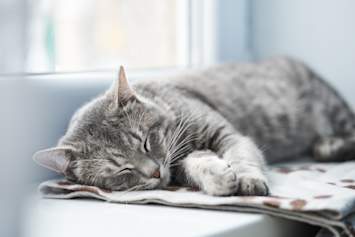
Chronic pain, seizures, anxiety – these feline issues can be tough to decipher. Gabapentin might be the key to unlocking a happier, healthier life for your cat.
Seeing your cat suffer is heartbreaking. Gabapentin offers a ray of hope, providing relief for various feline ailments and promoting a happier, healthier existence for your furry friend. With your vet’s expertise and this medication, your cat can spend less time feeling unwell and more time enjoying all the things they love, from chasing laser pointers to napping in sunbeams.
What is Gabapentin for Cats?
Gabapentin started its medical journey as a human anticonvulsant medication used to prevent seizures in people with epilepsy. Beyond its original purpose, gabapentin was found to be effective in managing chronic pain, particularly nerve pain, and can even help alleviate symptoms of restless leg syndrome.
It was then adopted into the veterinary world to be used for similar issues in cats, mainly as a pain medication and anticonvulsant in combination with other medications. Gabapentin is also used as a short-acting antianxiety medication for cats that have a fear of travel, grooming, or veterinary visits. The way that gabapentin works isn’t fully understood, but it does seem to help with these issues in cats.
Gabapentin Uses in Cats
Let’s dig into the three main uses of gabapentin in cats in more detail:
Chronic pain relief: Long-lasting pain can be difficult to manage in cats, as you need something that is effective and safe enough to be given long-term. Gabapentin can fill this role, especially in cats experiencing neurological pain following a nerve injury or declaw surgery.
Seizure management: Epilepsy is a condition where cats suffer repeated seizures. It can be managed using anticonvulsant medications, such as gabapentin.
Reducing anxiety: Gabapentin has the added benefit of reducing anxiety for the short-term. This can be particularly beneficial for cats that have anxiety associated with travel or veterinary visits. If your kitty is purring, but also putting out their claws and fighting going into the carrier, it could be because they’re nervous. Interestingly, stress is one answer to the question, “Why do cats purr?”
Gabapentin Dosage for Cats
It’s important not to give gabapentin, or any other medication, to your cat unless prescribed by your veterinarian. The dose and frequency that you give it will depend on the size of your cat and what you’re trying to treat.
For example, cats that are receiving gabapentin as an anticonvulsant may require a smaller dose more frequently than a cat that is taking it for pain relief, but the gabapentin dosage for cats using it for anxiety is generally used as needed, an hour or two before the stressful event.
You’ll need a prescription from your veterinarian, so they will inform you how much gabapentin your cat should get and how often. Since gabapentin is used off label in veterinary medicine, you’ll want to strictly follow your vet’s guidelines.
What Are the Gabapentin Side Effects for Cats?
The most common side effect seen with cat gabapentin is sedation. This can come off as sleepiness, lethargy, or disinterest in doing their normal cat things. Other side effects include:
Incoordination, wobbliness, or clumsiness
Decreased appetite, vomiting
Behavioral changes such as increased yowling, meowing, or aggression
Often, the side effects of gabapentin for cats can be decreased by starting at a low dose and gradually increasing it until the desired dose is reached. If you notice any of these side effects in your cat, consult your veterinarian as a change in dose may be needed to make you and your cat more comfortable.
Cautions and Consideration for Gabapentin Use in Cats
For chronic pain and seizure control, gabapentin is typically a long-term medication. Any time your kitty is taking something for the duration, regular veterinary visits are a must to monitor the efficacy of the medication and to adjust dosage as needed. How often cats should visit the vet will depend on what condition is being treated and how well your cat is responding to gabapentin. Your vet will let you know how often they would like to see you and your kitty.
It’s also important to note that cats with certain health conditions, such as kidney disease, will need to have an altered dose or use a different medication as organ function can change how the medication is cleared from the system.
On that same note, gabapentin isn’t a medication that you want to end abruptly if your cat has been taking it for a long time. Cats with epilepsy can suffer from withdrawal seizures or other side effects. Instead, the dose should be tapered over a few days to a week.
Pet Insurance for Gabapentin
Chronic pain, seizures, and anxiety in cats can be not only emotionally taxing but financially burdensome as well. Managing these conditions often requires long-term medication like gabapentin, along with regular veterinary visits and potential additional therapies. The cost of these treatments can quickly add up.
Enrolling in cat insurance early, ideally when they're young and healthy, is a wise decision. This helps avoid pre-existing conditions being excluded from coverage later. Pet insurance plans offer reimbursement for a significant portion of veterinary expenses, potentially including medication costs like gabapentin.
Peace of mind comes with knowing your furry companion can receive the best possible care, regardless of unexpected health concerns. By planning ahead with pet insurance, you can focus on what truly matters – cherishing the special bond you share with your feline friend.
Is Gabapentin for Your Cat?
Our feline companions bring undeniable joy to our lives. From the rhythmic comfort of their purr to their playful antics, they enrich our world in countless ways. When faced with their health struggles, it's only natural to want to do everything we can to ensure their well-being. Gabapentin can be a valuable tool in managing various feline ailments, promoting a happier and healthier life for your cat.